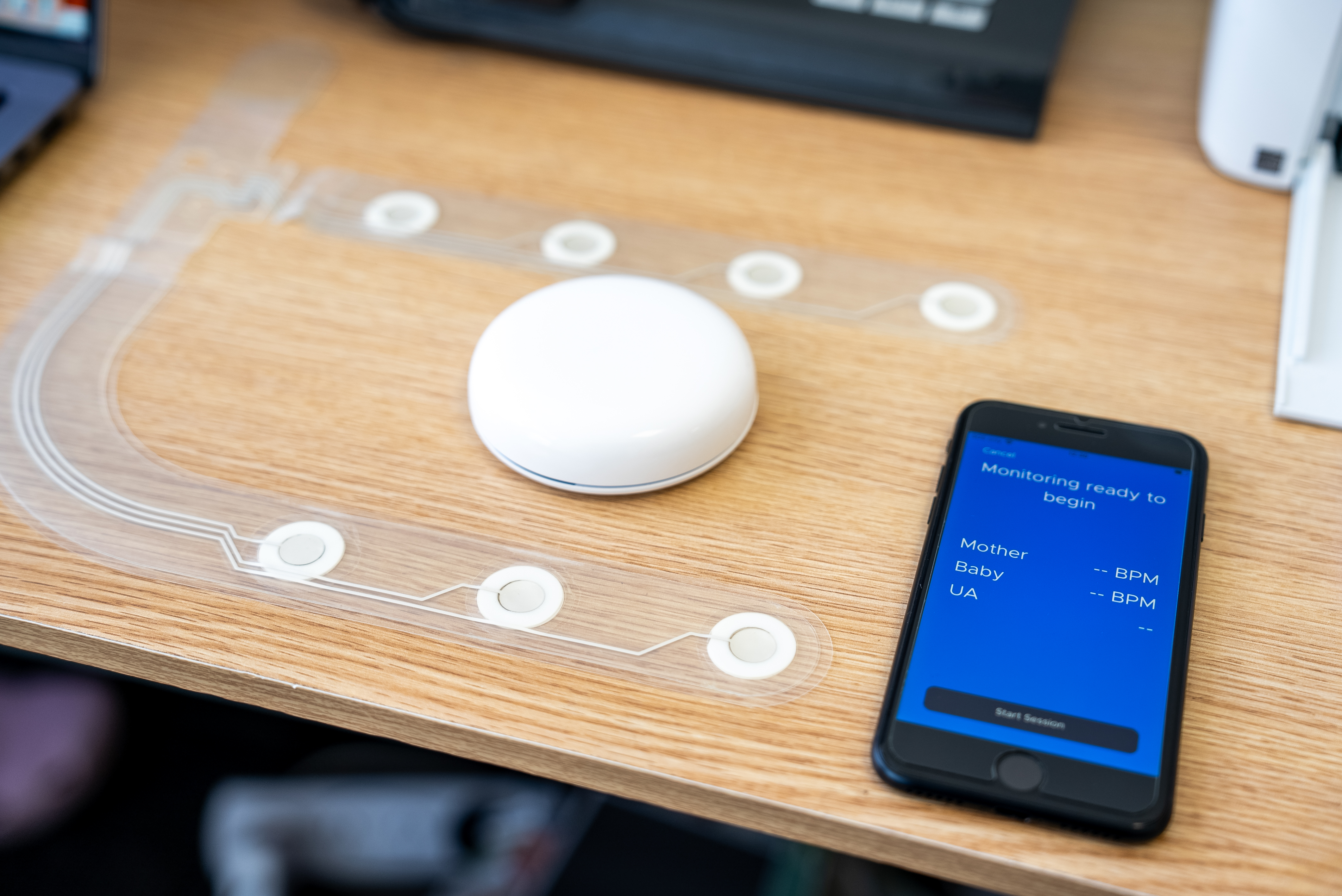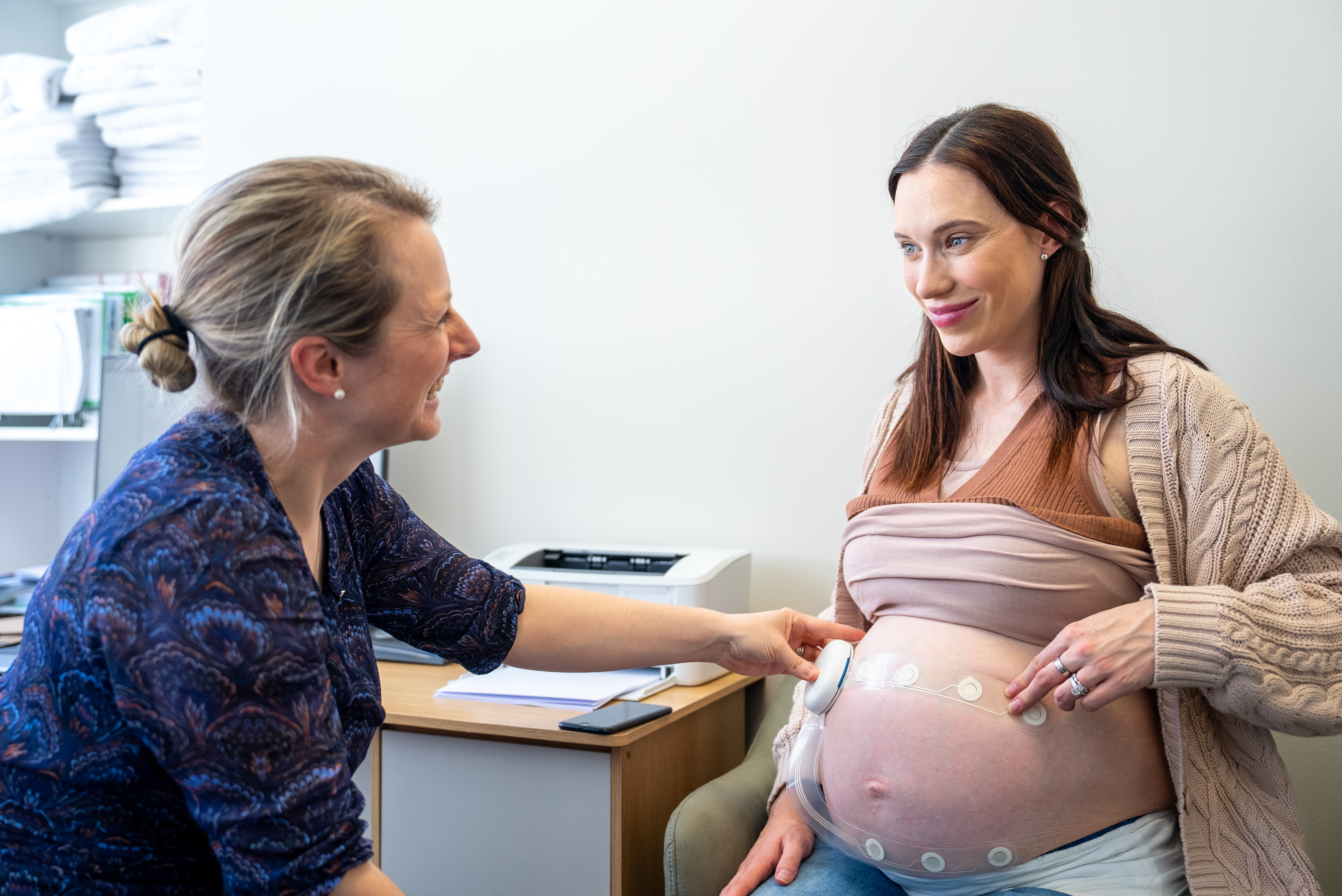University of Melbourne start-up Kali Healthcare has developed a new wearable AI-powered device that provides better access to safe and accurate pregnancy monitoring both within the hospital and at home.
The data produced by the device can be accessed during telehealth consults, allowing a clinician to identify any problems sooner and intervene if necessary.
The startup’s academic co-founders Dr Emerson Keenan, Professor Marimuthu Palaniswami and Associate Professor Fiona Brownfoot are a multi-disciplinary research team from the University of Melbourne.
Kali Healthcare’s new pregnancy monitoring system consists of a small wearable device and sensor patch that very accurately picks up a baby’s heart rate. It is simple to use and opens the possibility of monitoring at home during telehealth consults.
The challenge
Each year, more than 2,000 families in Australia endure the heartbreak of stillbirth – that’s equivalent to approximately one in 130 pregnancies.
Currently, women with high-risk pregnancies typically travel to and from hospital so healthcare professionals can monitor their baby’s heart rate. The monitoring equipment used has been relatively unchanged since the 1960s and relies on an ultrasound sensor being placed directly over the baby’s heart and held in place by an elastic strap.
During this process, pregnant women are usually confined to a hospital bed while clinicians measure the baby’s heart rate to see if there are any signs that the baby is in distress.
The significant cost and staffing burden of current ultrasound monitoring equipment means it is only readily available in metropolitan areas. So, for women living in rural and remote areas, having to attend hospital to be monitored on a regular basis creates significant time and cost pressures and causes unnecessary stress.

The opportunity
While looking for a PhD project that could incorporate his electronics and internet-of-things design skillset, Dr Keenan discovered Professor Palaniswami’s initial research focused on at-home pregnancy monitoring which was soon combined with clinical expertise from Associate Professor Brownfoot.
“The current technology isn’t convenient for clinicians, midwives or pregnant women so we focused on how we could develop technology that still provides accurate and consistent data but is more comfortable and convenient for women during pregnancy,” Associate Professor Brownfoot says.
“Two or three years into my PhD we realised that the technology was working and had commercial potential. We are incredibly grateful that the University has now invested in Kali Healthcare so we can accelerate getting our product to market,” Dr Keenan says.
“This device differs from competing devices due to how reliable it is in picking up the fetal heart rate – this is vital for clinicians so they can intervene if a baby isn’t coping well with pregnancy or labour,” Associate Professor Brownfoot adds.
The impact
UNICEF estimates that, somewhere in the world, a stillbirth occurs every 16 seconds. This means that about two million babies are stillborn every year. UNICEF says over 40 per cent of stillbirths occur during labour and this could be prevented with better monitoring and access to emergency obstetric care.

The support
The start-up has raised $1 million pre-seed investment, led by the University of Melbourne alongside LaunchVic’s Alice Anderson Fund and a consortium of private investors, and has built its business expertise through the University of Melbourne research impact accelerator program TRAM (Translating Research at Melbourne).
Combined with ongoing support from their development partners, Kali Healthcare co-founders Dr Emerson Keenan and Professor Marimuthu Palaniswami, say their new pregnancy monitoring technology can now be accelerated into the pivotal clinical trial phase by next year.
“The funding came just at the right time,” says Professor Palaniswami, a Fellow of the Institute of Electrical and Electronic Engineering and Professor within the University of Melbourne Department of Electrical and Electronic Engineering.
“The device now has to be formally tested to demonstrate it meets the requirements of the Therapeutic Goods Administration (TGA) and other regulatory bodies and then be approved for sale. To be tested, the device has to be commercially ready and this investment will allow us to get to that point.”
The team
Kali Healthcare was founded in 2020 with initial research, development and testing of the pregnancy monitoring system being carried out by Dr Emerson Keenan, as part of his PhD working between the Department of Electrical and Electronic Engineering and the Department of Obstetrics and Gynaecology.
Dr Keenan’s PhD at the University was supervised by Professor Palaniswami and Associate Professor Brownfoot and focused on developing the technology that supports the pregnancy monitoring system.
“I wanted to help design something that could make its way into clinical practice to help human lives and allow clinicians to focus on providing the best care possible, rather than being restricted by the limitations of their technology” Dr Keenan says.
The partners
The start-up has also received early support from the Medical Device Partnering Program (MDPP), Amazon Web Services and Neo-Bionica.
Dr Keenan also participated in the ANDHealth Masterclass: ACCELERATE Program for companies seeking to commercialise evidence-based digital health products.
Associate Professor Brownfoot’s work with Mercy Hospital for Women and Epworth Hospital has been invaluable in gathering feedback from women and clinicians who have shared insights about current pregnancy technology and how the Kali Healthcare device can be enhanced.
Early trials and research allowed the team to work out the best position for sensors and gather data that has been used to develop AI algorithms that reliably extract the fetal heart rate.
“Often in research, new technologies are developed in isolation. But in the real world there are competing businesses, funding constraints, as well as sales and distribution challenges,” says Dr Keenan.
“The start-up pathway gives you a complete perspective on what it means to develop commercially viable technology and provides a framework for approaching problems which exist at the boundary of research translation.”
The future
In the next 12 months, Kali Healthcare plans to be ready to commence their regulatory clinical trial. In 2 years’ time, that trial should be completed and a submission made to the TGA and other regulatory bodies for approval to take the device to market.
“Our ambition for this monitoring device is to be able to provide pregnancy care to women in remote and disadvantaged communities so those women can have the same level of care provided in metropolitan areas,” says Professor Palaniswami.
Enquiries and more information:
Genesis Ventures
- Hun Gan, CEO, University of Melbourne Genesis Pre-Seed Fund
- Brian Pang, Investment Manager, University of Melbourne Genesis Pre-Seed Fund
Kali Healthcare
- Dr Emerson Keenan, CEO, Kali Healthcare
First published on 7 November 2023.
Share this article